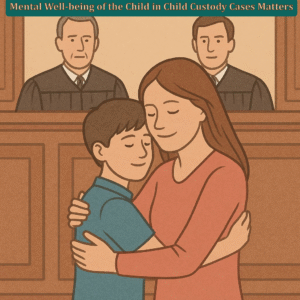
The deterioration in the mental well-being of the minor child owing to the changes in the custody orders by the Supreme Court compelled it to review its own order.
Neethu B v Rajesh Kumar 2025 INSC 853
Brief Facts of the Case
The couple married in the year 2011 as per Hindu rites & rituals, and a boy was born in the year 2012. Due to the discord between them, they started living separately in the year 2013 and decided to mutually get divorced in the year 2015. As per the joint agreement made by them the custody of the minor child was agreed upon to be with the mother and father to have visitation rights where he could meet his son on two Saturdays in a month. In the year 2016, the mother got remarried. In the year 2019, when mother approached the father of the child to get his signatures on the documents related to international travel, the father in order to prevent the child from travelling/ relocating to Malaysia filed a Child Custody case under Guardians & Wards Act in the jurisdictional Family Court seeking permanent custody of the child. The trial court rejected the father’s prayer and only allowed visitation on 2nd & 4th Saturdays and gave custody to the mother. And if the mother wished to take the minor child abroad with her, the court also ordered the mother to submit a statement before the court as to the details of the country, place of residence with address, duration of stay, etc. and also to file a statement after arrival before this court as to the date of arrival.
Both the parties appealed this judgement, the High Court of Kerala overturned the judgement and gave permanent custody to the father via order dated 17.10.2023. Mother was given virtual visitation rights on alternate days and physical visitation during half of the school holidays only if she is in India during that time. The High Court ordered this, considering the fact that relocation of the child to Malaysia would not be in the best interest of the child since he has a stable and well-settled life in Kerala.
The aggrieved mother appealed to the Supreme Court, which dismissed the appeal, upholding the High Court of Kerala order. However, the mother approached the Supreme Court with the Clinical Psychologist’s report that stated the deterioration of mental health of the child due to separation anxiety as he was taken away from the family that he believed was his support system. This caught the attention of the Supreme Court and considered the application for Review of its own judgement. On further perusal of the evidence presented before, the bench reversed its previous judgement and granted permanent custody to the mother, whereas father was given visitation rights both virtual and physical for the specified durations.
Observations made by the Court:
The clinical psychologist’s report stated that the child’s mental well-being has deteriorated as he is suffering from separation anxiety from not only his mother but also the entire family that he once thought was his support system. From the age of around 4 years old, the minor child is considering his step father as the essential father figure in his life. The stepfather also has extended a shield of affection and care towards the child and undertaken various commitments before the courts. The second child of his mother from her second marriage has become a sibling to him to whom he shows great amount of fondness. The second marriage of his mother and having another sibling has not altered any motherly devotion towards the minor child in question.
Reasoning
The Supreme Court emphasised that the welfare of the child is the paramount while deciding the Child Custody cases. The bench has dealt with this matter sensitively considering the emotional, intellectual, physical, financial, social and cultural needs of a growing child. Also stressed that orders in the custody matters to be considered as interlocutory orders and by the nature of such proceedings cannot be made rigid and final.
Also stated that the order of the court had an calamitous effect on the minor child who from the age of eleven months old was in the care and custody of the mother and was suddenly handed over to the father who had visited the child for a handful of times in the span of 12 years. The reports by the Clinical Psychologist from CMC,Vellore indicated that the child was undergoing significant anxiety, difficulty in coping with the emotions and separation anxiety due to the looming threat of custody change in the child’s head. It has been advised throughout these reports, to provide the child with a stable and emotionally supportive environment during this time of distress. Further, it has been strongly cautioned that any disruption in the existing support systems can further deteriorate the emotional well-being of the child.
It further stated that the minor child in question is at the cusp of adolescence. The factors defining the best interests of a child are multiple and range from quality education, a nurturing family environment, healthy worldly experiences, provision of basic amenities of life, meeting of financial requirements, access to a friendly social system to imparting of spiritual and cultural learnings. The list is naturally not an exhaustive one. However, the essential feature is that a secure, supportive and loving family forms the bedrock of a healthy childhood experience and helps one grow into a balanced, positive and confident adult.
Judgement:
The petitioner-mother was given permanent custody of the child, but she was not allowed to relocate outside India. However, the mother is allowed to travel abroad with the prior intimation to the court and the respondent-father.
The respondent-father was given physical & virtual visitation rights without overnight stay, where he is expected to build a bond with his son.
Parents are directed to continue to keep the child under the care and observation of the psychologists.
A Note on the Review Petitions in the Supreme Court:
The Supreme Court has been conferred the power to review its judgments by Article 137 of the Constitution of India, which is subject to the provisions of any law made by the Parliament or the rules made under Article 145 of the Constitution of India.
The scope of a review is usually considered very limited, and the grounds for maintainability of a review petition have been succinctly summarized by this Court in the case of Kamlesh Verma v. Mayawati (2013) 8 SCC 320 as follows:-
“20.1. When the review will be maintainable:
(i) Discovery of new and important matter or evidence which, after the exercise of due diligence, was not within knowledge of the petitioner or could not be produced by him;
(ii) Mistake or error apparent on the face of the record;
(iii) Any other sufficient reason.
20.2. When the review will not be maintainable:
(i) A repetition of old and overruled argument is not enough to reopen concluded adjudications.
(ii) Minor mistakes of inconsequential import.
(iii) Review proceedings cannot be equated with the original hearing of the case.
(iv) Review is not maintainable unless the material error, manifest on the face of the order, undermines its soundness or results in miscarriage of justice.
(v) A review is by no means an appeal in disguise whereby an erroneous decision is reheard and corrected but lies only for patent error.
(vi) The mere possibility of two views on the subject cannot be a ground for review.
(vii) The error apparent on the face of the record should not be an error which has to be fished out and searched.
(viii) The appreciation of evidence on record is fully within the domain of the appellate court, it cannot be permitted to be advanced in the review petition.
(ix) Review is not maintainable when the same relief sought at the time of arguing the main matter had been negatived.”
The principle has also been illuminated upon in the case of State of West Bengal & Ors. v. Kamal Sengupta & Ors. 2008 (8) SCC 612, wherein it has been held that this Court, “before entertaining review on the ground of discovery of new matter or evidence is required to record its satisfaction about three aspects, which can also be called as “triple test” i.e.,
(i) new matter/evidence discovered is of such nature which could change the judgment
(ii) such new matter/evidence was not within the knowledge of the party seeking review
(iii) same could not be produced before court even after due diligence. When any of the conditions of the test, as laid down above is not fulfilled, “discovery of new matter/evidence” ipso facto would not be sufficient ground for the Court to interfere with the finality of the judgment.”
Conclusion:
Every final judgement made by the court intends to be final. In the case discussed above the Supreme Court Bench observed that the child custody cases are the exception where changes in circumstances of the growing children demand that the custody orders are revisited considering the welfare of the children being paramount. Hence the apex court has reviewed its own judgement and altered it using the parens patriae jurisdiction.
For the complete judgement click here

Advocate Kiran S R – A highly skilled, passionate, dedicated advocate, with vast wealth of knowledge, professionalism, ethical approach and expert skills. One of the sharpest legal mindset brings the best principles of legal practice to the forefront. A qualified Engineer turned Advocate. His passion, dedication and vision to help and assist his clients achieve the best results is his driving force.

